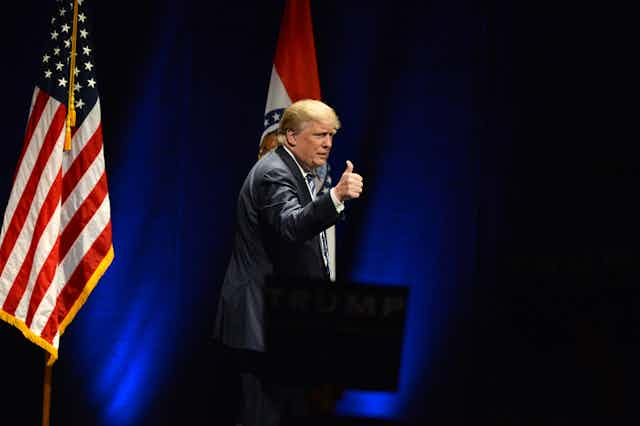The spate of pipe bombs sent through the mail in the US to prominent liberals was, in many ways, predictable. And the logical upshot of this is that those who have made it so should also bear some responsibility. Yes, someone made the weapons and sent them out – and they must face justice. But we must also acknowledge the role of those who forged the hate-fuelled, increasingly divisive environment in which the attacks took place.
In 2001, George W Bush told the world that the US could no longer afford to make any distinction between terrorists and those who harboured them. Despite the fact that it was hard to find agreement on what “harbour” meant, the role of those sharing and spreading toxic violent ideology was certainly and unanimously included.
Today, President Donald Trump is arguably the world’s most prominent hate preacher, inspiring and promoting acts of violence against perceived political enemies. Trump has long revelled in and benefited from the performance of a violent masculinity, hulking over Hillary Clinton, boasting of sexual violence against women, and winning the support of many disaffected and disillusioned American men. Indeed, the day before the pipe bombs began being sent across America, Trump seemingly endorsed the use of violence against political enemies.
“I had heard he body-slammed a reporter,” Trump said of Republican Greg Gianforte, who was sentenced to community service and anger management classes after attacking a Guardian journalist. “Anybody that can do a body-slam … that’s my kind of guy.”
This all builds upon longstanding themes in his personal and national storytelling. The reason the “ordinary American” – the country’s backbone – has been so badly downtrodden over the years, he tells voters, is because of continued betrayals and bad deals. America can be made great again – only by him – if the “enemies of the people” are called out and dealt with.
Elites in the media (one of the pipe bombs was also destined for CNN) and the Washington swamp must be drained out of political existence, if America – and true Americans – are to flourish again. And the tactics for doing so, the president of the United States has suggested, can include violence.
Checks and balances

Words matter. Indeed, those two words might be a suitable summary of over a decade of research on the relationship between language and terrorism, which has shown that powerful and emotional narratives are productive; they create the reality of life in the US, including the wars it fights. Today, that war is at home, between competing wings of the political spectrum. It has turned violent partly because of the language that has been used by the man elected to the highest office in the land.
When Trump was elected, even among calls not to normalise his ascendancy, many hoped that the Founding Fathers had seen him coming, constructing a system of checks and balances, with adequately divided powers, such that ambition might counteract ambition. To an extent, that was true at the start. But we now see a Supreme Court, both houses of congress, and a White House aligned with a man who apparently encourages violence within the US against American citizens.
Even those who spoke of the need to think of the American government as a hybrid regime – combining democratic and autocratic traits – following Trump’s election, might be surprised by how low the country has descended. Fortunately, November – and the mid-term elections – offer an opportunity to begin to change American politics through, rather than by undermining, its democratic credentials.

